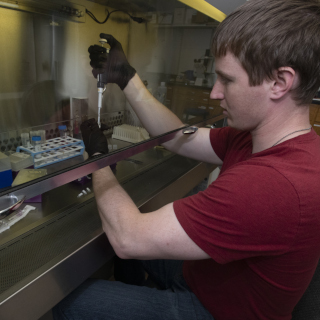Faculty and Research Areas
Faculty and Research Areas
The research conducted by University of Montana Molecular and Biomedical Sciences (MBS) faculty is diverse in scope. The following is a partial list of areas that you could pursue as a graduate student here at the University of Montana. We encourage you to access the web pages of the faculty associated with the research areas listed below, and contact them directly to learn more about their programs of discovery. All of these faculty members are currently involved in graduate training, and many have openings for new students in their laboratories.
If you are a faculty member with MBS, you can update your personal profile in the UM Employee Database.
Brandon S. Cooper
Associate Professor
Contact
- Office
- ISB 308
- brandon.cooper@umontana.edu
- Office Hours
By appointment.
- Website
- http://www.cooper-lab.org/
Education
NIH and NIAID Postdoctoral Fellow, University of California-Davis, 2014-2017
PhD, Indiana University-Bloomington, 2014
Courses Taught
Current:
Global Leadership Seminar: Global Change and Human Disease Transmission, fall 2023
BIOM 420, Host-Microbe Interactions (full writing course), some springs
BIOB 595-02, Advanced Evolutionary Genetics & Genomics (CHALK) Seminar, each spring and fall
Past:
BIOB 160N, Principles of Living Systems, each fall
BIOM 491-01, Host-Microbe Interactions, spring 2019/2020
Research Interests
Host-microbe interactions, speciation, and other evolutionary genetic problems
Field of Study
Evolutionary Genetics
Population Biology
Host-Microbe Interactions
Selected Publications
Hague M.T.J., J.D. Shropshire, C.N. Caldwell, J.P. Statz, W.R. Conner, and B.S. Cooper. 2022. Temperature effects on cellular host-microbe interactions explains continent-wide endosymbiont prevalence. Current Biology. 10.1016/j.cub.2021.11.065.
Shropshire J.D., E. Hamant, W.R. Conner, and B.S. Cooper. 2022. cifB transcription largely explains cytoplasmic incompatibility variation across divergent Wolbachia. Proceedings of the National Academy of Sciences (PNAS) Nexus. 1:pgac099.
Beckmann J.F., K. Van Vaerenberghe, D.E. Akwa, and B.S. Cooper. 2021. A single mutation weakens symbiont-induced reproductive manipulation through reductions in deubiquitylation efficiency. Proceedings of the National Academy of Sciences (PNAS). 118:e2113271118.
Shropshire J.D., E. Hamant, and B.S. Cooper. 2021. Male age and Wolbachia dynamics: Investigating how fast and why bacterial densitites and cytoplasmic incompatibility strengths vary. mBio. 12:e02998-21.
Matute D.R. and B.S. Cooper. 2021. Comparative studies on speciation: 30 years since Coyne and Orr. Evolution. doi.org/10.1111/evo.14181.
Hague M.T.J., Caldwell C., and B.S. Cooper. 2020. Pervasive effects of Wolbachia on host temperature preference. mBio. 11:e01768-20
Hague M.T.J., H. Mavengere, D.R. Matute, and B.S. Cooper. 2020. Environmental and genetic contributions to imperfect wMel-like Wolbachia transmission and frequency variation. GENETICS. 215:1117-1132.
Cooper, B.S., D. Vanderpool, W.R. Conner, D.R. Matute, and M. Turelli. 2019.Wolbachia acquisition by Drosophila yakuba-clade hosts and transfer of incompatibility loci between distantly related Wolbachia. GENETICS. 212:1399-1419.
Meany, M.K., W.R. Conner, S.V. Richter, J.A. Bailey, M. Turelli, and B.S. Cooper. 2019. Loss of cytoplasmic incompatibility and minimal fecundity effects explain relatively low Wolbachia frequencies in Drosophila mauritiana. Evolution. 73-6:1278-1295. 73
Cooper, B.S., A. Sedghifar, W.T. Nash, A.A. Comeault, D.R. Matute. 2018. A maladaptive combination of traits contributes to the maintenance of a Drosophila hybrid zone. Current Biology. 28:2940-2947.
Turelli, M., B.S. Cooper, K.M. Richardson, P.S. Ginsberg, B.P. Peckenpaugh, C.X. Antelope, K.J. Kim, M.R. May, A. Abrieux, D.A. Wilson, M.J. Bronski, B.R. Moore, J. Gao, M.B. Eisen, J.C. Chiu, W.R. Conner, A.A. Hoffmann. 2018. Rapid global spread of wRi-like Wolbachia across multiple Drosophila. Current Biology. 28:963-971.
Cooper, B.S., P. Ginsberg, M. Turelli, and D. Matute. 2017. Wolbachia in the Drosophila yakuba complex: pervasive frequency variation and weak cytoplasmic incompatibility, but no apparent effect on reproductive isolation. GENETICS. 205:333–351.
Affiliations
EE
CMMB
Specialized Skills
SCIENCING
International Experience
My lab carries out field work on multiple continents, with much of our work taking place in west Africa.
Honors / Awards
National Science Foundation CAREER Award
National Institutes of Health Early State Investigator Award (R35 MIRA)
National Institutes of Health Established Investigator Award (R35 MIRA)
Hobbies
Mostly just being a dad.

